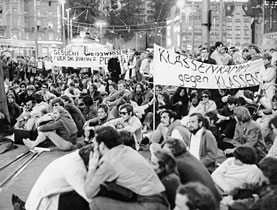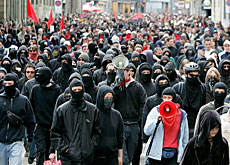1968 in Switzerland – of hippies and hedgehogs

Switzerland may not have seen as many spectacular scenes in 1968 as Berkeley, Milan, Paris, Berlin, Tokyo or Prague but it was also affected by the wave of protests.
The 68 movement attacked the conservative social rules of the 1950s and managed to bring about a cultural revolution against a background of a healthy economy and strained international relations.
Pacifism, the rejection of authority, the nuclear issue, anti-consumerism, the sexual revolution, life in communes, the return to nature – as well as the slogan “it is forbidden to forbid” – also had their influence on Switzerland.
“History from 1965 to 1975 is very complex because there is an immense difference in perception between the strong images of the time and the events themselves,” recalls historian Hans-Ulrich Jost.
Everything started in the universities, which former Lausanne University rector Pierre Ducrey describes as “institutions from the Middle Ages that changed only with the arrival of the masses into the education system”.
Student unions sprang up with their demands for more democracy and more of a say in what went on. Basel, Bern, Geneva and Locarno experienced long-winded meetings, occupations and confrontations between the left and right.
Slogans
Slogans also attacked the expensive rents, transport and culture of the day.
It all passed off without violence, apart from a huge demonstration in favour of an autonomous centre, which ended with 60 people injured at the end of June 1968 in Zurich.
Peter Niggli, a student at the time and now director of the Swiss aid coalition Alliance Sud, remembers becoming an activist “out of solidarity with the others and because I was very shocked by police brutality”.
Beat Kappeler, a liberal economist, was one of those who occupied the rector’s office at Geneva University in February 1969.
“With the hippie movement, fantasy reigned and we seized the chance to counter the Victorian morals of our fathers with freer ways of living,” he recalls.
Kappeler continued his studies in West Berlin, where “pure Marxism” was the order of the day. Caught between “those who wanted to change life and those who wanted to seize power” Kappeler opted to join the Social Democratic Party before distancing himself.
“Icy wind”
Whether they have changed colours or remained on the left, those young people who experienced 1968 are now approaching retirement.
Those on the political right who support former Justice Minister Christoph Blocher of the Swiss People’s Party have been calling for a return to the values that existed before 1968.
Lausanne historian Jean Batou feels that the 1968 movement came about as a reaction to conservative ideas.
“An icy wind of the 1950s was blowing across society, torn between the Cold War and a patriarchal vision of life. Moreover, Swiss leaders who had not changed with the events of the Second World War, cultivated a hedgehog mentality – rolling up into a ball to protect themselves from the outside world.”
There is also the economic context of the day. “People lived in a time of unparalleled growth, there was increasing urbanisation and consumer habits were becoming more American,” historian Jost explains.
“Post-industrial modernity, with the development of services, nuclear power stations and motorways was believed to be positive but at the same time, and despite the impression of stability, there was unease between those in authority and certain social groups.”
Atomic bomb
Apart from the rejection of capitalism, there was also a fear of the atomic bomb, opposition to the Vietnam War and dictatorships, as well as solidarity with new independent states.
“These ideas also flowed into the anti-globalisation movement,” Batou says. “But the big change came about with the replacement of the old, male, military guard by the 1968 generation.”
Niggli feels that 1968 changed social relationships, emancipated individuals and women, weakened the authoritarian behaviour of the state and put more democracy into life. “However, the anti-capitalist movement totally failed.”
Kappeler holds a different view. “Our generation, whether on the left or the right, took over the controls of power and influenced state legislation. We thought we were entitled to do everything and this spread to other areas, to the extent that we felt everything should be permitted. These ideas don’t age well and take responsibility away from people,” he said.
“However, what is clear is that there is a ‘before’ 1968 and an ‘afterwards’ and it’s as clear as when colour replaced black and white in televisions.”
swissinfo, based on an article in French by Isabelle Eichenberger
The Swiss National Science Foundation has launched a research programme called: The 68 movement in Switzerland.
April 4-August 10: Lausanne History Museum holds an exhibition entitled: A rebel Switzerland. 1968-2008
September 13, 2008-June 28, 2009: Liestal Museum is holding an exhibition: Rebels! 1968 and today.
May 2-3: International conferences at the universities in Lausanne and Bern.
Summer 1967: Demonstrations in the United States against the war in Vietnam.
Autumn 1967 in Italy: Occupation of the Roman Catholic universities in Milan and Turin.
March 1968 in Locarno: Student occupation of a teachers’ training college.
April 11 in Berlin: Attack on Rudi Dutschke, a prominent leader of Germany’s student movement.
May 13 in Paris: Unions and leftwing parties join students in a demonstration of about a million people against French President Charles de Gaulle.
June 28/30 in Zurich: At least 60 people are injured in clashes with police over an autonomous centre.
June 1969 in Basel: Demonstration for free public transport in the city.

In compliance with the JTI standards
More: SWI swissinfo.ch certified by the Journalism Trust Initiative


You can find an overview of ongoing debates with our journalists here. Please join us!
If you want to start a conversation about a topic raised in this article or want to report factual errors, email us at english@swissinfo.ch.